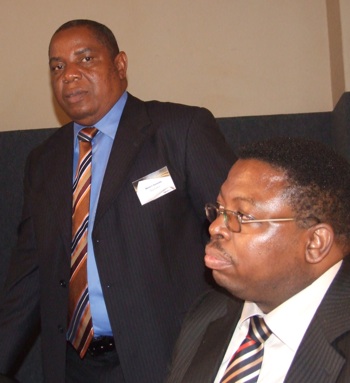 Amid the worst recession in a generation, IT services company GijimaAst is pumping financially, thanks to increased spending on technology by government.
Amid the worst recession in a generation, IT services company GijimaAst is pumping financially, thanks to increased spending on technology by government.
The company has lifted its dividend by 43%, to 5c/share, and reported sales up 20% in an industry where average sales growth in the past year has been about 5%. The results have sent the share price soaring more than 15% since the results were released last week.
Public sector business is now the biggest part of GijimaAst’s business, says CEO Jonas Bogoshi, pictured with nonexecutive chairman Robert Gumede (left). “It’s now 44% of our business from around 25% four years ago,” Bogoshi says. “This is thanks to the fact that we have guys who really understand the public sector and we took time to invest in the big opportunities and they’re starting to pay dividends.”
GijimaAst has won a number of mega-deals in government in recent years, including a multibillion-rand tender to improve the IT systems at the troubled department of home affairs. “The public sector is continuing to grow while the private sector is flat and this is why we’re performing well relative to the rest of the industry,” Bogoshi says.
Long-term service contracts have also helped GijimaAst weather the economic storm better than many other companies in the sector. Services now account for 82% of the company’s sales, from 80% previously.
Analysts TechCentral spoke to say the results far exceeded their forecasts. “The results are very good, strong, better than I expected,” says Kaplan Equity Analysts MD Irnest Kaplan. “This share is a buy. For the next year or two you won’t go wrong. These are sterling results on all fronts.”
The company has increased its cash on hand to R484m, putting it in a strong position to make acquisitions. It generated R362m in cash in the year. This marks a significant turnaround for a company that almost went belly-up after the IT bubble burst at the beginning of the decade.
However, the bottom line was impacted negatively during the 2009 financial year due to intergroup loans that were affected by currency movements. Though earnings before interest, tax, depreciation and amortisation rose 82% to R283m, operating profit rose only marginally, to R196m from R171m in 2008. Volatility in exchange rates led to a R51m exchange rate loss compared to an exchange rate gain of R48m in 2008.
If the impact of exchange rate translation gains and losses are eliminated, GijimaAst’s normalised earnings per share for the year improved by 88%, the company says. — Duncan McLeod, TechCentral



